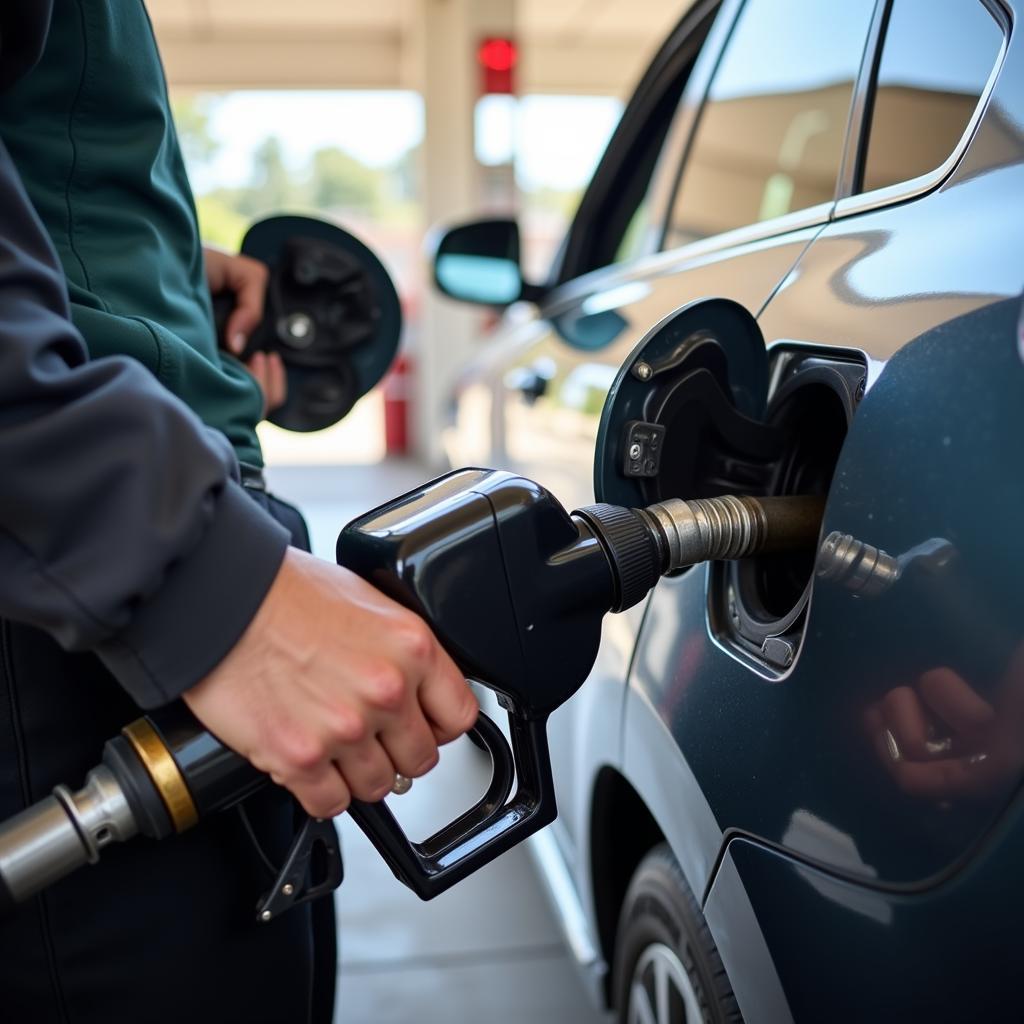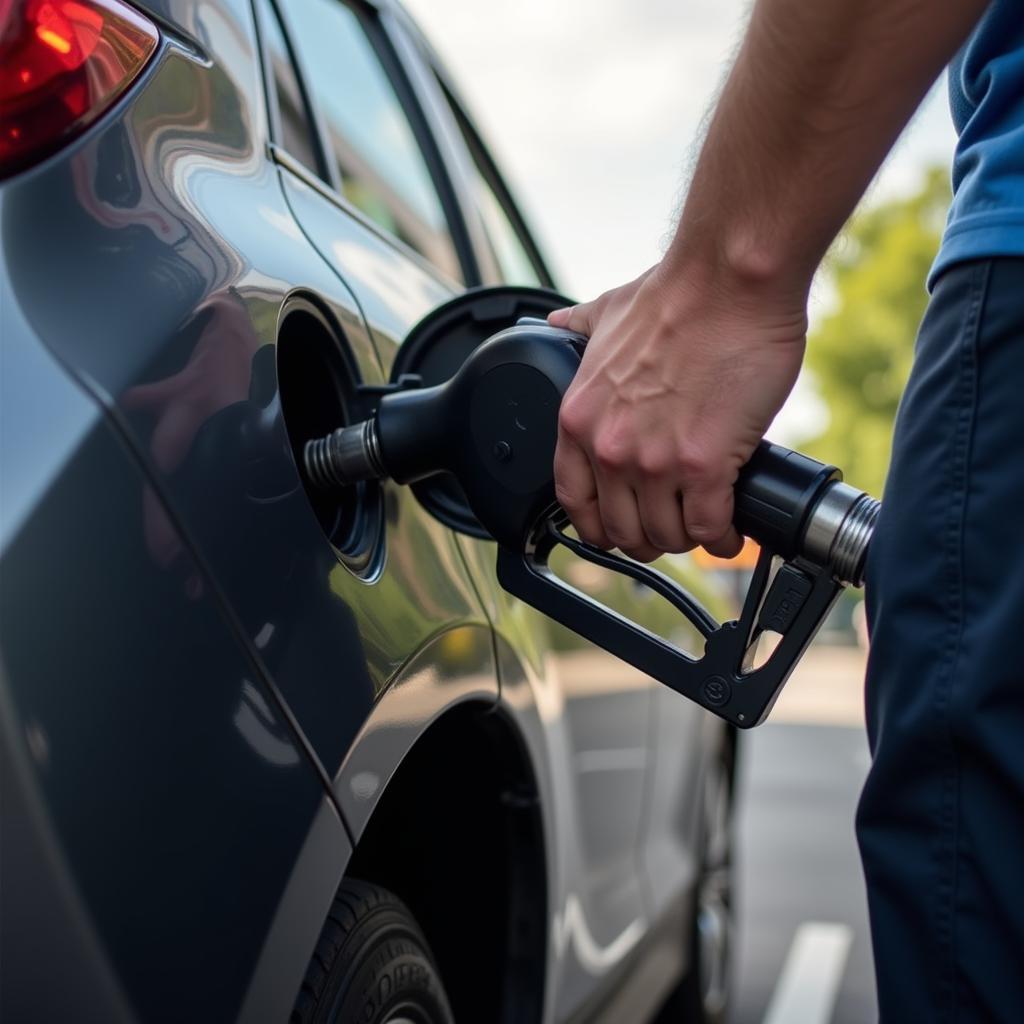It’s frustrating when your car starts smelling like gas after you’ve just filled up the tank. It’s not only an unpleasant experience but also a potential safety hazard. This smell could indicate a serious issue with your car’s fuel system, so it’s important to address it promptly.
This article will explore common reasons why your car might smell like gas after filling up, explain how to diagnose the problem, and provide practical solutions to fix it. We’ll also offer helpful tips for preventing this issue from recurring.
Common Reasons for Gas Smell After Filling Up
Several factors can contribute to your car smelling like gas after filling up. Here are some of the most likely culprits:
1. Overfilling the Tank
Did you know? Overfilling your tank can lead to a gasoline smell because the fuel expands in hot weather, causing it to leak out of the tank.
 Overfilled car fuel tank
Overfilled car fuel tank
Here’s the deal: Modern vehicles have a system that prevents overfilling. However, if you fill your tank too close to the top, the expansion of gasoline in hot weather can lead to spillage, resulting in a gas smell.
Solution: Always leave some space at the top of your tank when filling up. Don’t try to “top off” the tank.
2. Loose Fuel Cap
A loose or damaged fuel cap can allow fuel vapors to escape, creating a gas smell.
 Loose gas cap
Loose gas cap
Here’s the deal: Your fuel cap is designed to seal the fuel tank tightly and prevent fuel vapors from escaping. If it’s loose, damaged, or missing, you’ll likely notice a gas smell, especially after filling up.
Solution: Inspect your fuel cap to ensure it’s properly seated and free of damage. If the cap is damaged, replace it with a new one.
3. Leaking Fuel Lines
Fuel lines carry gasoline from the tank to the engine. If they are damaged or cracked, they can leak, causing a gasoline smell.
Here’s the deal: Leaking fuel lines are a serious problem that can lead to a fire hazard. If you suspect a fuel line leak, it’s essential to address the issue immediately.
Solution: A professional mechanic should inspect your fuel lines for leaks and replace any damaged components.
4. Leaking Fuel Injectors
Fuel injectors spray gasoline into the engine’s cylinders. If they leak, it can cause a gasoline smell, especially after filling up.
Here’s the deal: Leaking fuel injectors can also affect your car’s fuel efficiency and performance.
Solution: Have your fuel injectors inspected and cleaned or replaced by a qualified mechanic.
5. Faulty Fuel Pump
The fuel pump pushes fuel from the tank to the engine. If the pump is malfunctioning, it can leak or cause pressure buildup, leading to a gasoline smell.
Here’s the deal: A faulty fuel pump can also cause engine problems, so it’s important to address this issue promptly.
Solution: Take your car to a mechanic to diagnose and repair any issues with the fuel pump.
6. Evaporative Emission Control System (EVAP) Problems
The EVAP system is designed to capture fuel vapors and prevent them from escaping into the atmosphere. If the system is malfunctioning, it can lead to a gasoline smell.
Here’s the deal: A faulty EVAP system can trigger a check engine light and impact your car’s emissions.
Solution: A mechanic can diagnose and repair any EVAP system issues, such as a clogged charcoal canister or faulty EVAP vent valve.
Diagnosing the Problem
If your Car Smells Like Gas After Filling Up, it’s important to diagnose the underlying cause to address the issue effectively. Here are some steps you can take:
- Check the fuel cap: Ensure the cap is tightly closed and not damaged.
- Look for fuel leaks: Inspect the area around the fuel tank, fuel lines, and engine for any signs of leaks.
- Observe the fuel gauge: Watch the fuel gauge after filling up to see if it drops quickly, which could indicate a leak.
- Smell for gasoline: Identify the source of the smell. Is it coming from the fuel tank, the engine compartment, or the exhaust?
- Have a mechanic inspect your car: If you can’t identify the cause, take your car to a qualified mechanic for a diagnosis.
Preventing Gas Smell After Filling Up
Here are some tips to prevent your car from smelling like gas after filling up:
- Fill your tank slowly: Don’t rush the filling process. Stop filling when the nozzle clicks to avoid overfilling.
- Avoid “topping off” the tank: Leave some space at the top of the tank.
- Check your fuel cap regularly: Ensure it’s tightly closed and free of damage.
- Get regular maintenance: Have your fuel lines, fuel injectors, and other fuel system components inspected during regular car maintenance.
- Address any fuel system issues promptly: Don’t ignore any signs of fuel leaks or other fuel system problems.
Conclusion
A gas smell after filling up can be alarming, but understanding the common causes and solutions can help you resolve the issue quickly and safely. Always check your fuel cap, inspect for leaks, and consider having your fuel system components checked by a professional mechanic. Remember, it’s essential to address any fuel system issues promptly to prevent safety hazards and maintain your car’s performance.
FAQ
Q: What is the safest way to address a gas smell after filling up?
A: The safest way is to contact a professional mechanic immediately. They can diagnose the problem and recommend the best course of action to ensure your safety and your car’s health.
Q: Can I try to fix the issue myself if I know the cause?
A: While you may be able to fix some minor issues like a loose fuel cap, it’s always best to have a professional mechanic address more complex problems, especially those related to fuel lines, injectors, or the fuel pump.
Q: How often should I check my fuel cap?
A: It’s a good idea to check your fuel cap every few months or whenever you notice a gasoline smell.
Q: Why is it important to address a gas smell promptly?
A: A gas smell can indicate a leak in your fuel system, which poses a fire hazard. It’s also important to address the problem to prevent further damage to your car’s fuel system.
Q: What are the signs of a leaking fuel line?
A: Signs of a leaking fuel line can include a strong gasoline smell, a wet area around the fuel lines, a drop in fuel level, and a decrease in engine performance.
Q: How can I prevent my car from smelling like gas?
A: You can prevent your car from smelling like gas by filling your tank slowly, avoiding “topping off” the tank, checking your fuel cap regularly, and having your fuel system inspected during routine maintenance.
